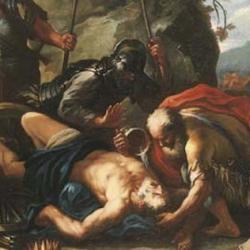The account of David’s reign in 1 Chronicles alternates between house-building and war, house-building and international recognition and repute. David builds his house, and then fights Philistines, spreading fear throughout the region (1 Chronicles 14). Then David brings the ark into Jerusalem, places is in a tent, and makes plans to build a house (1 Chronicles 15-17). Then David fights Philistines and Ammonites (1 Chronicles 18-20) before settling in for the rest of Chronicles to arrange for the temple project.
Chapter 20 is one of the battle sequences. Like 1 Chronicles 11, it recounts the exploits of David’s mighty men—Joab’s conquest of the Ammonite city of Rabbah, the giant-killing prowess of Sibbecai and Elhanan and Jonathan (11:4-8). Each of them fights giants, carrying on the conquest that Joshua had started. Elhanan and Jonathan kill giants that resemble Goliath; Elhanan defeat Lahmi, Goliath’s brother, and Jonathan kills a six-fingered, six-toed giant of Gath, Goliath’s home town.
The description of the giant of Gath hints at other dimensions of these battles. He is said to be a “man of stature” (‘ish middah), literally a “man of measure.” middah is primarily used in architectural texts, referring to the measurements of tabernacle (Exodus 28:2, 8-9; 36:15) or temple (1 King 6:15; 7:9, 11, 37; 2 Chronicles 3:3) curtains, furnishings, and areas. Ezekiel uses the term 25x in chapters 40-48, all describing measurements of his visionary temple, and in Nehemiah the term refers to “measured sections” of the city wall. A man of measure is large, even monumental; he is a walking building, perhaps a walking sanctuary, the human house of an idol. By overthrowing a man of stature, Jonathan overthrows the Philistine gods. Measured things are holy, devoted to God; and a man of measure is unwilling being sanctified to glorify Yahweh’s name. Men of measure are mountainous men, but they are ground to rubble before David’s giant-killers.
In several other places, middah refers to human beings. Isaiah 45:14 envisions a day when Sabean “men of measure” will come to bow to the God of Israel, and to the Israelites themselves. They are great, monumental men, but they are also measured because they have been devoted to Yahweh’s service. Aaron is described in similar terms in Psalm 133: Unity of the brethren is like oil on Aaron’s head that comes to the edge of his middah. The Psalm compares the priest to Mount Hermon. The priest is himself a mountainous man, a monumental figure, a temple-in-person, measured because he is devoted to the Lord from head to hem.











